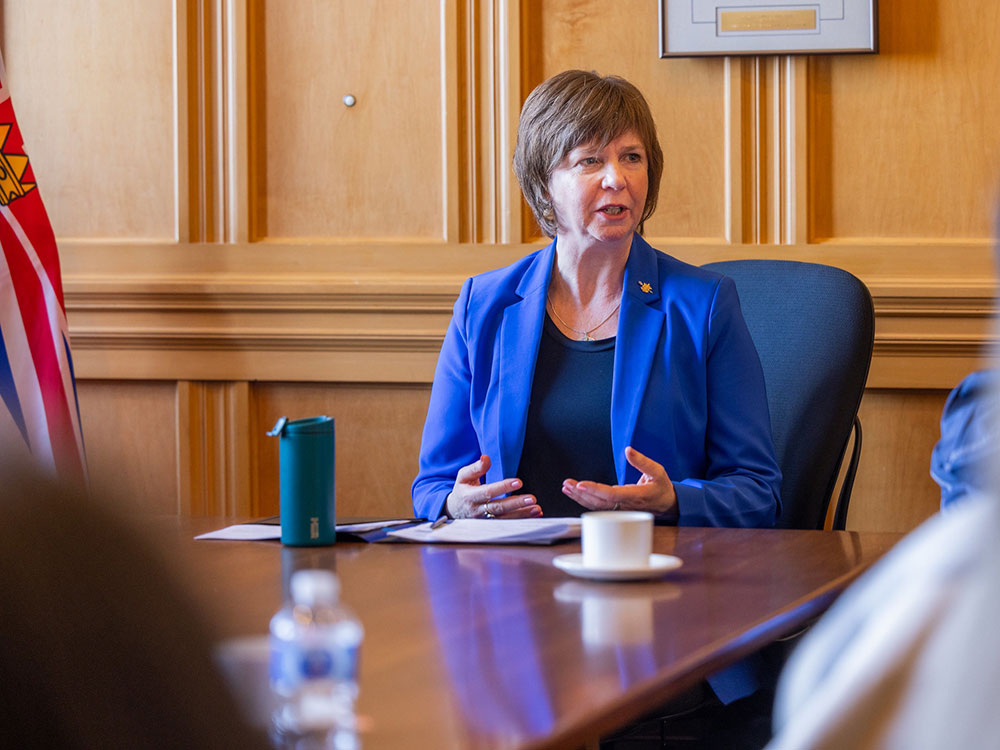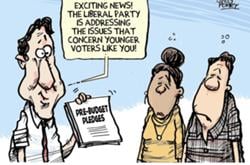The B.C. government is waiting to see the details of a promised federal benefit for people with disabilities before deciding whether people receiving provincial disability payments will be allowed to keep the full amount.
“We want people to have as much money in their pockets as we can,” Sheila Malcolmson, B.C.’s minister of social development and poverty reduction, told The Tyee. “We’ve been waiting for the details, and so we’ll be analyzing how the two benefit streams come together and take the advice of people we’ve been hearing who need all that support.”
Parliament passed Bill C-22 to establish a federal disability benefit more than a year ago and the Senate approved it last May, but the government has yet to say how much the benefit will pay or how they think it should interact with provincial programs.
The federal budget is scheduled for release April 16, and anti-poverty and disability groups have been advocating for including enough money to bring the incomes of people receiving provincial disability benefits above the poverty line.
In B.C., a single person with a disability receives $17,802 a year, plus about $1,750 in other provincial and federal credits and benefits.
Depending on where the person lives in the province, that leaves them about $5,000 short of the poverty line. Both the federal and provincial governments use the market basket measure from Statistics Canada as the poverty line.
In a nine-page policy brief published in February, Maytree policy adviser Mohy-Dean Tabbara argued the Canada Disability Benefit should streamline eligibility requirements to match provincial programs and that recipients should be allowed to keep the full amount. Maytree is an anti-poverty organization.
“The Canada Disability Benefit is an opportunity to guarantee that people with disabilities can live a life with dignity and have an adequate standard of living,” Tabbara wrote. “The federal government should seek assurances from all provinces and territories that social assistance benefits will not be reduced because someone is eligible for the CDB.”
Malcolmson said B.C. is waiting for details from the federal government before deciding how the new benefit will be harmonized with provincial eligibility requirements and whether it would be considered income that should be deducted from provincial benefits.
Allowing people to keep the benefit would be consistent with how the province has treated other federal payments like residential school reparations and COVID benefits, she said. “But until we have the details in front of us we haven’t made that decision yet.”
James Schultz, a 41-year-old man in New Westminster who has received B.C. disability benefits since around 2010, said the provincial government should bring its own rates up to the poverty line while everyone waits for the federal benefit to start.
It was “appalling” that the B.C. budget released last month failed to raise disability assistance, Schultz said. “I would have assumed that given that we have had such a spike in global inflation on food prices and all this other kind of stuff that the B.C. budget would have wanted to prioritize poverty.”
Mental health and physical issues have made it impossible for him to work full time or hold a job long term, he said, though he does work part time.
When he was younger he worked enough that he qualifies for Canada Pension Plan disability payments, but the B.C. government subtracts the amount from his provincial benefits, he said.
“How is that fair and how is that justified when I paid into a federal benefit that’s supposed to help myself out if I become disabled, yet I end up having the province claw that back?”
Though Schultz said he is lucky to have housing thanks to inheriting a small home from his mother, he believes the low rate of provincial support contributes to the increase in homelessness throughout the province.
Rates would need to be bumped up by about $600 a month to bring people to the poverty line, he said, adding that he’s aware B.C. is planning to release an updated poverty reduction plan soon. “It’s disgusting what’s going on here in B.C.,” he said. “How can you have a poverty reduction plan if you don’t have a PWD [Person with Disabilities benefit] increase? It would make absolutely no sense.”
Malcolmson said the full poverty reduction strategy is coming next month, but on Tuesday she introduced legislation that sets a 10-year goal to reduce overall poverty by 60 per cent, child poverty by 75 per cent and seniors' poverty by 50 per cent from 2016 levels.
The bill also makes changes Malcolmson said would allow the ministry to better support people on income and disability assistance to find and keep employment.
As of the government’s October update on its previous 2018 poverty strategy, based on 2021 figures, overall poverty was already down 45 per cent and child poverty was down 54.6 per cent since the 2016 baseline.
“We know anecdotally that people are under considerably more pressure than they were in 2021, so the need for us to do more is absolutely clear,” Malcolmson said Tuesday.
Inflation is hitting hard, visits to food banks are up and the ministry is receiving more requests for emergency help, she said. “All those metrics tell us people are hurting more than they were in 2021 and that’s why we’re deepening our efforts today.”
Raising income and disability rates since 2017 helped the province meet its previous poverty reduction targets, Malcolmson said, adding that the province also raised the earnings exemptions, allowing benefit recipients to keep more money that they earn through employment.
“We are always trying to move the dial,” Malcolmson said when asked about the failure to raise income and disability assistance rates in the recent budget. The previous government froze the rates for many years, she said. “We’ve been moving them up in steps, five times already, and again surely more will come again.”
The BC Green Party put out a statement saying it’s not good enough to just reduce poverty. “We need a poverty elimination strategy,” said leader Sonia Furstenau. “We need entirely new thinking around how people with disabilities and on income assistance are served so programs are a path out of poverty and not a prison.”
The Greens called for an immediate increase to income and disability rates. ![]()
Read more: Rights + Justice, BC Politics

















Tyee Commenting Guidelines
Comments that violate guidelines risk being deleted, and violations may result in a temporary or permanent user ban. Maintain the spirit of good conversation to stay in the discussion and be patient with moderators. Comments are reviewed regularly but not in real time.
Do:
Do not: